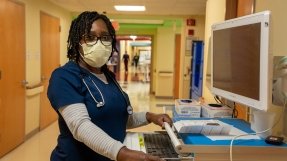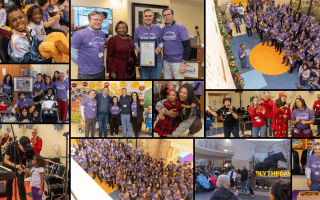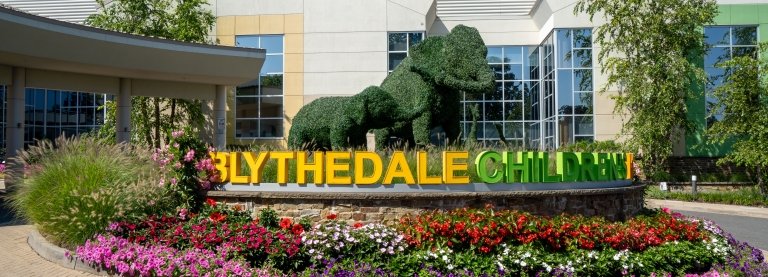Respiratory Therapy at Blythedale Children’s Hospital
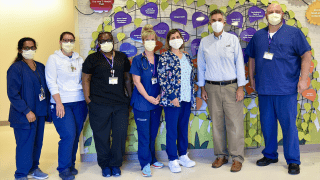
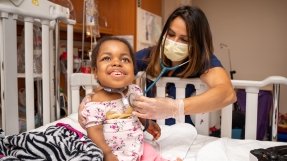
The simple act of breathing is an essential function most people likely take for granted.
At Blythedale Children’s Hospital however, where more than a third of the patients are admitted for intensive pulmonary rehabilitation, there is a dedicated clinical care team following countless protocols and measures in place to ensure that all children, ranging from tiny prematurely born infants through adolescents, can breathe with ease and, often, take their first breath free from mechanical ventilation.
Blythedale’s team of 30 full- and part-time respiratory therapists are at the core of that team, working 24/7 alongside pediatric pulmonologists, neonatologists, pediatricians, nurse practitioners, speech therapists, nutritionists, and experienced nurses and educators, to care for the Hospital’s most fragile patients.
For the parent or caregiver of an infant, child or adolescent with a complicated pulmonary illness, a respiratory therapist is an essential member of any multidisciplinary care team.
“Having worked in children’s hospitals for 40 years, I know the importance and value of respiratory therapists,” said Blythedale President & CEO Larry Levine. “Here at Blythedale Children’s Hospital, given the predominance of infants and children with complex pulmonary conditions, their role is critically important, and they are among our greatest assets in providing holistic comprehensive care to medically fragile young patients.”
Because of Blythedale’s clinical expertise and state-of-the-art medical technology and monitoring equipment, the Hospital is able to seamlessly take over the complex medical treatment started at the NICUs and PICUs at the major medical centers in the region.
To best meet the needs of its referring hospitals, Blythedale has made significant investments in the most modern respiratory support technology, including critical care ventilators such as the Astral 150, EV 300, Servo-I and LTVs. Non-invasive support devices such as the Airvo, bubble CPAP, Trilogy, Vapotherm high flow systems and more are also used in order to transition infants and children as safely and quickly as possible from the intensive care unit (ICU).
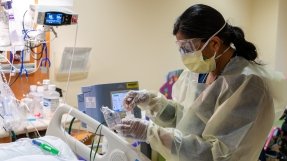
In the past year alone, the Hospital treated 50 children with very high ventilator settings due to severe bronchopulmonary dysplasia, a serious chronic respiratory condition that most frequently occurs in low birth weight or extremely prematurely born infants. Many respiratory therapists are drawn to Blythedale by the volume and complexity of the cases, as well as the treatment modalities and therapies they can employ to achieve desired outcomes in a wide range of patients.
According to Jill Wegener, Senior Vice President of Patient Care Services at Blythedale, it is the broad scope of the practice that enables these therapists to practice at the highest level of their field.
“We continue to push the clinical envelope – always saying, ‘what’s next, what’s out there, what do our ICU referrers need?’” Wegener said. “The trajectory of the kids that are now being sent to Blythedale, compared to ten years ago, is completely different. They are literally coming right out of the ICU on high PEEP (positive end-expiratory pressure) settings, very complex ventilator settings that we didn’t manage here 10 years ago. Since then we’ve expanded our medical devices, clinical expertise and treatment modalities so we are able to get kids out of the ICU much sooner, start parent education and vent weaning, and hopefully trach decannulation so we can start them on that journey of decreasing their reliance on respiratory support.”
Since its inception in 1891, Blythedale has been on the forefront of caring for patients with complex medical concerns, from tuberculosis and polio in our earliest days to emerging medical disorders today. In the late seventies, Blythedale began admitting patients with severe asthma, and those who needed tracheostomy care. Recognizing the increased need for respiratory support for children, in 1985, the Hospital received approval to open a six-bed unit dedicated to the care of ventilator-dependent children.
This year, Blythedale celebrates 25 years of its nationally recognized Ventilator Weaning Program. This program is widely recognized as a national center of excellence due to the Hospital’s extraordinary success in weaning fragile infants and children from the technology previously needed to sustain their lives. At Blythedale, there are typically 50 ventilators running daily, the majority of which are utilized by infants and children at some stage in the ventilator-weaning process. Of those children, approximately 70% are successfully weaned.
At Blythedale, respiratory therapists provide care on the Infant and Toddler, Adolescent, and Traumatic Brain Injury Units, as well as The Steven and Alexandra Cohen Pediatric Long Term Care Pavilion. Respiratory therapists also work with patients from the community who attend Blythedale’s Day Hospital program, managing their ventilators, administering nebulizer medications, and providing specialty respiratory care throughout their patients’ busy day of therapy and school.
While the team enjoys the challenges that come with caring for such a diverse population, they uniformly agree on their favorite part of the job… the kids.
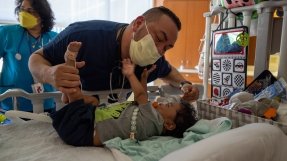
Lourdes Naranjo has worked at Blythedale for nearly five years, initially working with infants and transitioning to the long-term care unit.
“I love what I do,” she said. “Especially when I can make a child smile or ease their pain. It gives me such peace of mind at the end of the day when I know I was able to help them. It is a very nice atmosphere, and we are like family in the long-term care unit.
Christine Stack has a great deal of experience with medically fragile children, but only made a career of it last year. Stack got a crash course in respiratory care 25 years ago when her twin daughters were born at just 28-weeks’ gestation, weighing a mere two pounds apiece. One had severe bronchopulmonary dysplasia and is now a speech therapist while the other went on to become a respiratory therapist. Stack’s 22-year-old daughter has cystic fibrosis, a complicated genetic disorder of the lungs.
She first learned of Blythedale through a nurse that provided in-home care to her daughters. She began pursuing studies in respiratory therapy when her youngest daughter was a senior in high school.
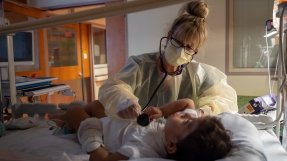
She enrolled in Blythedale’s volunteer program and days before starting in March 2020, COVID-19 forced the closure of the program.
“I always wanted to work with children,” she said. “And I thought I would be a good fit at Blythedale because I appreciate the medical field and everything that goes into the work here, and I have always had very high standards for myself.”
She joined Blythedale’s Respiratory Therapy team last year and notes that one of the most gratifying aspects of her job is having an opportunity to help the parents and caregivers, from the perspective of someone who has walked in their shoes.
“I get it when a parent is having a bad day,” she said. “The poor mom sleeping next to her child’s bed for three months, she’s tired and I get it. I appreciate them and I understand their expectations and the sacrifices they make.”
Respiratory therapists play an integral role in helping prepare parents to bring their children home. The Hospital’s newly built state-of-the-art Simulation Lab and Parent Training Center replicates bedside and home settings where parents learn to care for their medically fragile child utilizing high-tech mannequins that simulate potential medical crisis situations. This teaching is conducted in a supportive, controlled environment, in preparation for their discharge home.
The task often seems daunting to parents, who typically have had little-to-no hands-on experience caring for their medically fragile child in the NICU or PICU. At Blythedale, they are immediately immersed in learning to care for their child, beginning with lessons on giving a bath or changing clothes, and progressing to suctioning trachs and responding to ventilator alarms, all under the watchful eye of respiratory therapists and nurse educators.
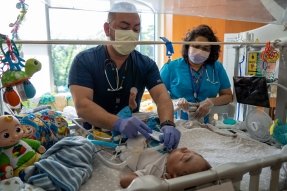
Teaching new respiratory therapists is key to the success of the program, with preceptors assigned to help acclimate newer staff. This fall, the Hospital is also embarking on an intensive eight-to-10-week training program for new graduate respiratory therapists. The new Respiratory Therapy Residency program will include a robust curriculum of didactic education, hands-on training in Blythedale’s state-of-the-art Simulation Lab and preceptor-led one-on-one orientation on the clinical units.
“We have such a unique patient population here at Blythedale and a tremendous learning opportunity for new respiratory therapists,” said Wegener. “Everything they see here, every single day, under our roof, is something they may not experience in an acute care center. Here we have very seasoned respiratory therapists who have been here 10, 15, 20 years, who really know our kids and are good teachers. Our new staff benefit from the clinical expertise and support from both the educational wisdom of our leadership team and the experiences with front-line preceptors.”
While treatment modalities change to adapt to newer technologies and protocols are tweaked to optimize outcomes, at the core of the work is a shared vision to maximize every child’s potential and improve their quality of life.
